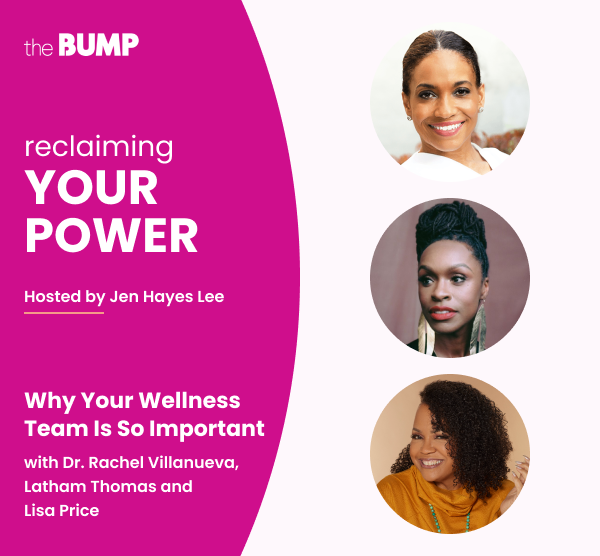What to Expect at the First Prenatal Visit
You got a positive pregnancy test—congratulations are in order! Now it’s time to plan your first prenatal visit. You might be feeling nervous (or is that morning sickness already?!), and you probably have lots of questions, but not to worry—your provider will be there every step of the way. In the meantime, you might want to brush up on what to expect at your first pregnancy appointment. Ready for answers? We’ve consulted with ob-gyns on all the important info.
After you get that positive test, you can take a day or two to soak in the news and celebrate, but it’s a good idea to book that first prenatal visit with your chosen ob-gyn or midwife pretty soon after. (If you haven’t picked a provider yet, you’ll want to get on that ASAP!)
Andrea Braden, MD, IBCLC, an ob-gyn and founder of the lactation company Lybbie, advises to “be on the safe side and give the office a call as soon as you find out you’re pregnant.”
It’s ideal to schedule your first prenatal visit for when you’re around 7 to 8 weeks pregnant, says Braden. Doctors recommend this timing because that’s when an ultrasound can likely detect baby’s heartbeat. (The earliest a fetal heartbeat can be detected is around week 6, according to Cleveland Clinic.)
If you’ve had complications in an earlier pregnancy, you may want to go in earlier than 7 to 8 weeks. “Sometimes we want to watch these early pregnancies closer because with a history of complications, you have an increased risk of having complications in a subsequent pregnancy,” notes Braden.
On the other hand, if you miss the 7-to-8-week mark, Braden says the goal would be to get you in before 12 weeks, when the first trimester ends. “After that point, just get in as soon as you can because there will be some catching up to do!” she adds.
Want a handy checklist for your first prenatal appointment? Here’s what you need to prepare, according to the experts.
- The date of your last menstrual period (LMP). During your first pregnancy appointment, your ob-gyn will compare the LMP to an ultrasound to determine your due date, says Braden. “If the last period was irregular or unpredictable, sometimes you need to know the first day of the period before that one,” she adds.
- Your medications and medical history. Gather a list of medications and dosages to bring to your provider to discuss their safety during pregnancy, advises Michael Platt-Faulkner, DO, an ob-gyn at St. Elizabeth Physicians in Northern Kentucky. “Writing down any significant personal medical or surgical history and family history of genetic diseases is also helpful information for your visit,” he adds.
- Your pharmacy information. Your doc might prescribe prenatal vitamins or other medications, depending on your medical history, so make sure you have a convenient pharmacy in mind.
- Any questions about symptoms or other concerns. Those first-trimester symptoms—nausea, fatigue, peeing all the time—can cause anxiety. Plus, figuring out what to eat (and not to eat) and questions like “Can I have coffee while pregnant?” can be confusing. Platt-Faulker suggests writing all your questions and concerns down for your provider, so you don’t forget them in the heat of the moment.
- Somewhere to track the rest of your pregnancy appointments. “There will be a lot of information coming at you,” says Braden. “You want to have a place to write down future appointments and take any notes.”
What happens at your first prenatal visit can vary widely depending on your state and the type of practice you’re visiting, says Braden. In some practices, you get both an ultrasound and a consultation during your first pregnancy appointment, while other providers’ offices split up these to-dos.
Here’s generally what to expect at your first prenatal appointment.
Ultrasound
Your provider may perform an ultrasound to confirm the pregnancy, help determine your due date, check baby’s heart rate and check for any complications, according to Cleveland Clinic. “Oftentimes, an early-pregnancy ultrasound may use a vaginal probe and can be mildly uncomfortable—which can be helpful to know in order to be best prepared for your visit,” says Platt-Faulkner. By about 12 to 14 weeks of pregnancy, your provider will be able to hear baby’s heartbeat with a small device called a Doppler ultrasound, according to Mayo Clinic.
Medical history
“Your provider will review your pregnancy, medical and surgical histories in detail,” says Platt-Faulkner. “Your ob-gyn will [also] review how any medical diagnoses, pregnancy complications or surgical history may affect your pregnancy.” Your provider will also take a look at your medication list and discuss any pregnancy-related safety concerns with the medications you’re taking. Omoikhefe Akhigbe, MD, an ob-gyn at Pediatrix Medical Group in Maryland, adds that your provider may also discuss whether there are any specialty doctors you should start seeing or continue to see.
Lifestyle discussion
Your provider will discuss the lifestyle choices you plan to make during pregnancy. (Remember that, for starters, that means no smoking or alcohol.) “You’ll learn about foods that are safe to eat in pregnancy and the way to keep yourself healthy,” says Braden. “They will answer questions about exercise, diet, nutrition, rest, common symptoms and how to treat them and what to do if you do have discomfort in pregnancy.”
Genetic testing
At your first pregnancy appointment, your provider might perform or discuss future genetic testing. “There are genetic tests that are time-sensitive and can be done as early as 10 weeks,” says Braden. “There are some that are done with an ultrasound around 12 or 13 weeks pregnant, and some that are done in the second trimester. Depending on your history and what you desire, that’ll likely be brought up.” There are some specific tests your provider may offer based on your age or family history too, she adds.
Blood testing
You’ll likely get blood drawn during your first prenatal visit. You’ll be tested for a variety of conditions, including anemia, hepatitis B, syphilis and HIV, as well as for your blood type and Rh factor.
Urine testing
For starters, your provider might test a urine sample to confirm your pregnancy, as well as to test kidney function and screen for the presence of protein, as noted by the Cleveland Clinic.
Physical exam
You can expect a full physical exam at your first prenatal visit, which may include a pelvic examination and a breast exam. “If you’re due for a pap smear and you’re over 21 years of age, then you can expect that you’ll have a pap smear screening test done for cervical cancer along with an HPV test if indicated,” says Braden. “Typically, we also test for sexually transmitted infections at the time of the first prenatal visit.”
You’re likely full of questions—and that’s completely normal! Make sure to write them down—and bring this list to your first prenatal appointment in case you feel like you’re forgetting something.
- Questions about symptoms. Of course, you should bring any questions about symptoms to your appointment. Akhigbe says it’s also important to ask “when and where to call for an urgent question, what constitutes an emergency, what is an urgent question and what is a routine question that could probably wait for normal business hours.”
- Questions about testing. Which tests will you need during pregnancy? What will your insurance pay for? “Ask about common resources to use and where you can find the evidence-based information about your pregnancy and guidelines and information about tests,” advises Braden. A lot of people also want to know when they’ll find out baby’s sex, she adds. (Spoiler alert: With non-invasive prenatal testing (NIPT), you can find out as early as 10 weeks.)
- Questions about your ultrasound plan. How many ultrasounds will you get? “Sometimes it depends on insurance, sometimes it depends on your medical history and sometimes it depends on your provider. Do they do them in-house or at a different center?” says Braden.
- Questions about lifestyle choices. Your doctor will review information about how to eat a healthy pregnancy diet with you, but if you have any specific concerns—such as about drinking alcohol or eating sushi—be sure to let them know.
- Questions about logistics. You’ve got a long journey ahead of you! Your provider will likely “review their practice structure, visit schedule and confirm the hospital where you’ll deliver,” says Platt-Faulkner. But if they’ve missed anything, Akhigbe recommends asking follow-up logistical questions, like how many providers you’ll see and which doctor is most likely to deliver baby. (Remember, there are no guarantees!)
There’s a lot of information to take in at your first prenatal visit. It might seem overwhelming, so make sure to bring questions, take notes and do whatever else you need to feel comfortable. Bringing your partner or a good friend along for the ride can help ease some nerves too. “If you have a support person that will be going along this journey with you, it’s always great to bring them to this visit if that’s allowed,” says Braden.
While it might feel like a lot to take in, know that your provider is there to make sure you and baby are healthy during your first prenatal visit and throughout your whole pregnancy—and that you’re making a wonderful first step in your pregnancy journey.
Please note: The Bump and the materials and information it contains are not intended to, and do not constitute, medical or other health advice or diagnosis and should not be used as such. You should always consult with a qualified physician or health professional about your specific circumstances.
Plus, more from The Bump:
Omoikhefe Akhigbe, MD, is an ob-gyn and medical director at Pediatrix Medical Group in Maryland. She earned her medical degree from Meharry Medical College School of Medicine in Nashville, Tennessee.
Andrea Braden, MD, IBCLC, is an ob-gyn, board-certified lactation consultant and founder of the lactation company Lybbie. She earned her medical degree from the University of South Alabama School of Medicine.
Michael Platt-Faulkner, DO, is an ob-gyn at St. Elizabeth Physicians in Northern Kentucky. He earned his medical degree from the Heritage College of Osteopathic Medicine at Ohio University.
Cleveland Clinic, Fetal Development, March 2023
Cleveland Clinic, Ultrasound in Pregnancy, September 2022
Mayo Clinic, Prenatal Care: 1st Trimester Visits, August 2022
Nemours KidsHealth, Prenatal Tests: First Trimester, July 2022
Cleveland Clinic, NIPT Test, October 2022
Cleveland Clinic, Your First Prenatal Appointment: What to Expect, December 2022
Learn how we ensure the accuracy of our content through our editorial and medical review process.
Navigate forward to interact with the calendar and select a date. Press the question mark key to get the keyboard shortcuts for changing dates.




















































